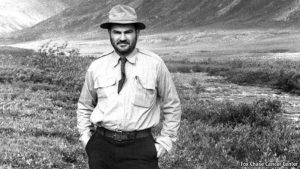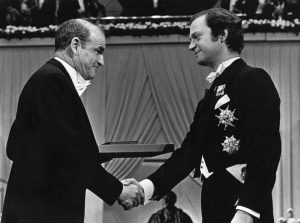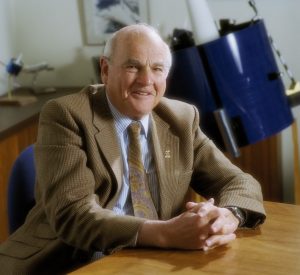In This Episode: Just how much impact one person can have by refusing to be stymied by those who don’t have it. Because he did that, you might owe this guy your life.
014: Expect the Unexpected
Tweet
How to Subscribe and List of All Episodes
Show Notes
- Help Support Uncommon Sense — yes, $5 helps!
- I mention Episode 8, The Man with the Golden Arm, so there’s the link.
- Much of my research on Dr. Blumberg is from a 2015 paper for the journal Astrobiology by Dr. Carl Pilcher, who was the Director of the NASA Astrobiology Institute from 2006 to 2016.
- There are several photos in the transcript, below.
Transcript
I’d like to tell you another story of Uncommon Sense that shows just how much impact one person can have by refusing to be stymied by those who don’t have it. The hero of this story is named Barry Blumberg, who was born in Brooklyn, New York, in 1925. … And you may very well owe him your life.
Welcome to Uncommon Sense, I’m Randy Cassingham.
In college, Baruch Samuel Blumberg, who preferred to be called Barry, was interested in math and physics. But World War II interrupted his studies: he served in the U.S. Navy, eventually rising to be the captain of his own small amphibious ship. In the Navy, Blumberg learned responsibility, logistics and infrastructure, and planning — and not just planning but, it being wartime and all, always having a contingency plan ready too. Which came in handy: His motto: “Expect the unexpected,” and indeed you can expect that what Blumberg did was quite unexpected.
After his discharge, he used his G.I. Bill benefits to attend Union College in Schenectady, where he graduated with honors in 1946. But he had learned that he wasn’t quite suited for physics, so he moved on to Columbia’s College of Physicians and Surgeons, where he received his doctorate in medicine in 1951. He stayed in New York to get through his internship and residency, during which time he went on medical research missions to Dutch Guiana (now known as Suriname), the Basque region of Spain, Nigeria, Greece, islands in the Pacific, Mexico, South America, and the American arctic.

These experiences were giving him an idea. He was intrigued by “questions of diversity in relation to disease stimulated by my [internship] experiences at Bellevue [Hospital] and in the jungle hospital in Suriname,” he wrote years later. “Of particular interest are inherited differences among individuals and populations that result in differential disease susceptibility,” he continued, “because these can often be detected before the person is exposed to [a] disease hazard. It was this notion that became the driving force in our research. If we could precisely identify the susceptibility factors before a person became sick, then we might be able to intervene to prevent the illness. The idea of a disease-free life — or, to be more realistic, a life with less disease — might be possible.”
This was decades before “preventative medicine” took the prominence it has today, so he’s already a forward, outside-the-box thinker, one of the markers of Uncommon Sense.
To further his research ideas, Blumberg studied at Balliol College of Oxford University in England, and earned his Ph.D in biochemistry in 1957.
Dr. Blumberg had a lot of interests, as you might be starting to gather. He liked to think of himself as an explorer: his heroes included evolutionary biologist Charles Darwin, Ernest Shackleton (the explorer of Antarctica), and Lewis and Clark, the leaders of the first American exploration of the west of the continent, an expedition commissioned by President Thomas Jefferson. While at Balliol, Blumberg would trek into the English countryside just to see what he could find.
How did that apply to biochemistry? “He would gather huge amounts of data, with exuberant curiosity, in order to let some discovery surprise him,” said one obituary. As a doctor, the way he did that was take blood samples from patients with all sorts of maladies, to study and see if he could see differences to explain, say, why some patients at Bellevue Hospital ended up with tuberculosis, and others …didn’t, even though they were exposed to the disease.
Another of those diseases that struck different populations more than others was yellow jaundice, a liver disorder, and in 1964 Dr. Blumberg went to Australia to study that: it was common in the aboriginal people there. As usual he got blood samples, and found an unknown protein on the blood cells of an infected patient — an antigen. You might remember from Episode 8, The Man with the Golden Arm, that antigens stimulate the production of, or are recognized by, antibodies, and the antibodies “target” antigens. In fact, antigen is really a contraction which means “antibody generator” — anti-gen. And what really got his attention was, when the so-called “Australia Antigen” — the blood serum of that aborigine — was mixed with the blood of a hemophilia patient from New York City who had received a lot of blood transfusions, it reacted! That indicates an infectious origin, rather than an inherited one. He was on the cusp of a breakthrough.
By 1966, after a lot of research, Blumberg confirmed what the antigen was: a virus that was the immune-response trigger of hepatitis B, at the time one of the biggest killer diseases in the world — and much more so in some countries than others; remember he was fascinated as to why that would be so. It was a big deal to figure out what caused hep B: no one had found it before. In fact, at the time, doctors didn’t even know hepatitis B was caused by a virus; some researchers had spent their entire careers trying to figure out how it was transmitted. They knew there were two types of “yellow jaundice,” now known as hepatitis A and B, and they knew the latter had something to do with blood, or at least blood serum, but not a lot more. At the time, they didn’t even know that hepatitis B led to liver cancer — and it does.
So why was it so important to find the cause of the disease? Well, because Dr. Blumberg’s discovery enabled him and his research team to develop a test for hepatitis B. That would help curb the spread of the disease from, for instance, blood transfusions! In the U.S., it became required by law to test donated blood for hep B in 1972. So if you’ve had a blood transfusion since then, you probably owe him your life. Before then, all bets were off: my father in law had chronic hep B because of a blood transfusion in the 60s. Man, he missed it by that much!
And because it was so important, Dr. Blumberg wrote his findings up for a medical journal, the Annals of Internal Medicine — his first scientific publication. And the journal …rejected it. After all, what the heck did he know? He was just a biochemist, not a virologist! (I think maybe the journal’s peer reviewers didn’t have Uncommon Sense: they sure didn’t “Expect the Unexpected”!)
I’d like to read you a section of a paper Dr. Carl Pilcher, who was the Director of the NASA Astrobiology Institute from 2006 to 2016, wrote on Dr. Blumberg:
It was around this time that Barry read Thomas Kuhn’s The Structure of Scientific Revolutions and realized that his team was on the cutting edge of a grand paradigm shift of the sort described by Kuhn. As Kuhn pointed out, the prevailing paradigm is not easily dislodged. As data accumulate that undermine the prevailing paradigm, its adherents resist. Only when the data become overwhelming, and a new paradigm is available to replace the old, does the scientific community swing quickly to a new way of thinking. This is what Kuhn termed a ‘‘scientific revolution.’’ So Barry and his team were not only explorers, they were revolutionaries as well. And although revolutions may erupt quickly, it generally takes a much longer time for the effects of a revolution to become the new normal. And so it would be for the effects of this new understanding of hepatitis.
But, grudgingly, over time the other researchers all had to admit that Blumberg was right, because they were able to replicate his findings. And Blumberg made it easy by supplying the reagents for testing: the antigens derived from the aborigine’s blood serum. That sped up testing because researchers from all over the world could jump right on it.
But even more important, and this took some more time because the virus wouldn’t grow well in laboratory conditions, by 1969 Blumberg and Dr. Irving Millman of the Fox Chase Cancer Center in Philadelphia developed a vaccine for hepatitis B. But again, their solution was rejected: virologists knew full well the virus couldn’t be grown easily in a lab! But Blumberg and Millman had procured enough of the virus to produce a vaccine anyway — by harvesting it from the blood of patients who had the disease! It just wasn’t done that way! But Blumberg wasn’t held to “the prevailing paradigm” that he wasn’t trained in! So he was able to really live by the motto, “Expect the Unexpected”! Sadly, it took six years — 1975 — for a pharmaceutical company to sign up to make the vaccine. Eventually, the virus was able to be grown in cells using recombinant DNA technology, which drove the cost way down, and hepatitis B vaccination became widespread by the 1980s, saving millions of lives every year. In fact, the vaccine is now so cheap that medical workers get it routinely to keep them from getting the disease from their patients. That’s why I got it, as a volunteer medic. And it’s all because Dr. Blumberg had his own way of doing research outside the prevailing paradigm.
So it probably won’t surprise you to learn that Dr. Blumberg, a mere biochemist, was awarded the Nobel Prize for Medicine in 1976.

Which of course meant that Blumberg had his choice of professional offers. So where did he go? He was already a Professor of Medicine and Anthropology at the University of Pennsylvania. But he went back to Balliol to become the first American to be the Master of the college since it opened in circa 1263! He was also the first scientist to be the Master there …not counting an Alchemist in the 14th century.
In 1989 he joined Stanford University’s Program on Human Biology. And just down the road from Stanford is NASA’s Ames Research Center. Dr. Blumberg went there for a workshop on Astrobiology — Ames just happens to be the NASA Center for that discipline. When NASA’s Administrator Dan Goldin found Blumberg was fascinated by the field, which researches whether life can exist elsewhere in the universe in part by studying how it originated and evolved on Earth, Goldin recruited Blumberg as the Director of NASA’s new Astrobiology Institute in 1999, where he studied so-called extremophiles, organisms that live in what we think of as hostile environments, such as hot volcanic vents deep in the ocean, or in the exceptional cold of a lake buried by a half-mile of ice in Antarctica. In fact, life thrives in both of those places. And by the way, if you do the math, Blumberg was 74 when he accepted the position.
All of which is a vindication of his Uncommon Sense. And that’s to our benefit: Dr. Jonathan Chernoff, the scientific director of the Fox Chase Cancer Center, said, “I think it’s fair to say that Barry prevented more cancer deaths than any person who’s ever lived.” Blumberg went into medicine in the first place, he said, because “There is, in Jewish thought, this idea that if you save a single life, you save the whole world.” And for millions upon millions of people, he did.
Again, here’s Dr. Carl Pilcher, the Director of the NASA Astrobiology Institute from 2006 to 2016:
In many ways, Barry’s career was exemplary of how science should be conducted and increasingly how it will have to be conducted in the future. Barry always worked across the traditional academic disciplines. He recognized that these disciplines were not inherent to nature but were created by academics to help organize knowledge and educate future scientists. While disciplinary education and thinking still has a role to play, it has become common for disciplinary distinctions to be a barrier to advancing knowledge rather than a conduit. [Emphasis from the original]
Or as Thomas Kuhn may have put it, Blumberg’s thought process itself might be a scientific revolution.

Even after he stepped down as the founding Director of NASA’s Astrobiology Institute in 2002, Dr. Blumberg stayed plenty busy. He served on the Scientific and Medical Advisory Board of the Hepatitis B Foundation, which he had helped found. He served on the Library of Congress Scholars Council, and as the President of the American Philosophical Society. And he was a Distinguished Scientist at NASA’s Lunar Science Institute, which is probably why, in April 2011, he delivered the keynote speech at the International Lunar Research Park Exploratory Workshop held at Ames. Shortly after he stepped off the stage, no doubt to a standing ovation, he died of a heart attack, at 89. But thanks to his amazing Uncommon Sense, Dr. Blumberg leaves a legacy that will continue for as long as humans exist.
You can comment on this episode, and see photos of Barry Blumberg, on the Show Page at thisistrue.com/podcast14
I’m Randy Cassingham … and I’ll talk at you later.
– – –
Bad link? Broken image? Other problem on this page? Use the Help button lower right, and thanks.
This page is an example of my style of “Thought-Provoking Entertainment”. This is True is an email newsletter that uses “weird news” as a vehicle to explore the human condition in an entertaining way. If that sounds good, click here to open a subscribe form.
To really support This is True, you’re invited to sign up for a subscription to the much-expanded “Premium” edition:
Q: Why would I want to pay more than the minimum rate?
A: To support the publication to help it thrive and stay online: this kind of support means less future need for price increases (and smaller increases when they do happen), which enables more people to upgrade. This option was requested by existing Premium subscribers.

Thanks for this thoroughly enlightening report on Dr. Blumberg.
Wow… It’s always wonderful to realize what you don’t know about what you don’t know! This is why, at 76 going on 38, I love learning and always have.
—
Learning exercises your mind. I want to learn something every day. -rc
Absolutely fascinating man and you have told his story beautifully. Thank you for these looks at extraordinary individuals who have shaped our world — for the better.